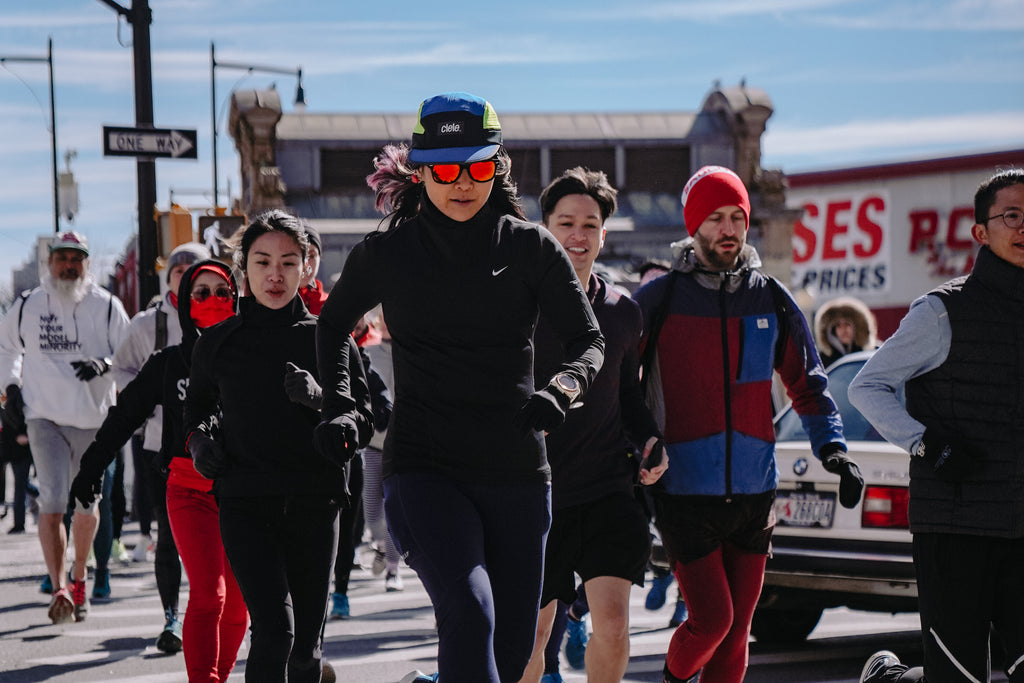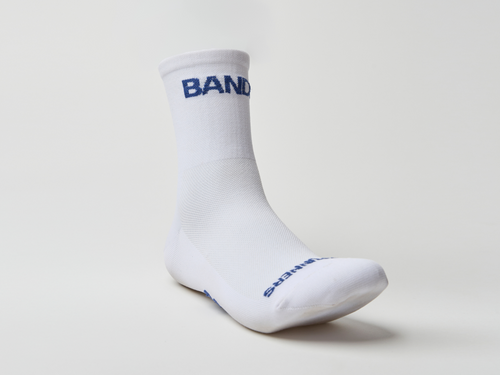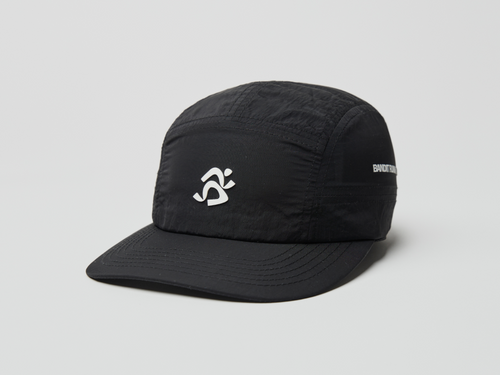This content was created in partnership with Chinatown Runners, a collective of runners around the world coming together in solidarity with AAPI communities and beyond. For more information on how to get involved visit the Chinatown Runners website or follow CTR on Instagram.
Chinatown Runners is not a crew. It's a movement.
ABSORBING THE ENVIRONMENT
On a recent Saturday morning, a group of about 30 runners gathered in front of the Queens Public Library in Flushing. All were outfitted with the names of different run crews throughout the city. All were there for a 5k neighborhood run organized by Queens Distance Runners, World’s Fair Run Crew, and Chinatown Runners, the latter of which puts on monthly activations to unite running groups and give back to local Chinatowns and other Asian American and Pacific Islander (AAPI) neighborhoods.
Victoria “Vics” Lo, the 36-year-old founder of Chinatown Runners, stood on the top of the steps and welcomed the runners. “I like to start every event by thanking everyone who showed up today,” she said. “The most valuable currency you could ever give to a person, event, or organization, is your time and energy.”

Runners share the streets with people who live and work in neighborhoods like Flushing, one of the largest Chinatowns in New York City, and Lo reminded everyone to acknowledge and respect that fact, and to support local businesses however they can.
“It’s not just part of our training runs, it’s their lives, so let’s take the opportunity to pause and absorb and appreciate the environments around us,” she said.
The group nodded and clapped. Soon they were running down a bus lane, the sidewalks too bustling to pass through. They ran by restaurants with cavernous dining rooms, street vendors hawking everything from housewares to live crayfish, and narrow food stalls selling dumplings, baked flatbreads, and steamed rice rolls.
“No hot-dogging!” Lo shouted, reminding everyone to check their paces. “We stay together like sticky rice!”
TAPPING INTO THE COMMUNITY

The origins of Chinatown Runners began when Lo, a Chinese American, moved to New York from Seattle in 2013. She arrived as an avid distance runner who trained for marathons and found herself running with Bridge Runners, a running crew founded by Mike Saes and Cedric Hernandez in 2004.
“I realized, wow, there’s this whole untapped community of people of color, of people who look like me, from all different walks of life and backgrounds who kind of coalesce around this sport of running,” she said. “Bridge Runners is who I credit to introducing me to the culture of running crews and communities, which has played a huge part in what Chinatown Runners is.”
Lo emphasizes that Chinatown Runners is not a running crew. Instead, it exists as a decentralized movement for running crews across the globe to bring foot traffic and economic support to AAPI neighborhoods, which were particularly affected by xenophobia and other forms of hate during the pandemic. The movement takes inspiration from other coalitions like Running to Protest, which began in 2020 in response to the murder of George Floyd and racial violence against Black people. Running, Lo recognized, could be more than just PRs and race medals, but a powerful social activism tool—runners regularly come together for a shared moment, and those moments can be used to do good and raise awareness.
A tide of attacks against Asian Americans prompted Lo to start Chinatown Runners in February of 2021 while balancing a full-time job as a graphic designer. Friends describe Lo as an “amazing one-woman machine”—organizer, networker, and fundraiser. All the Chinatown Runners merch is designed by Lo with proceeds going to different charities that she promotes each month.
“I don’t sleep a lot,” Lo said, laughing. “Part of me organizing was, selfishly, a kind of therapy—a way to take back some power because I was starting to feel really frustrated by watching things happen and feeling like I couldn’t do anything about it.”
Outside of the monthly runs, Lo has plans to put on other events, including a partnership with Brooklyn Running Company and Soar Over Hate, a nonprofit that helps equip people to protect themselves and fight back against anti-Asian hate.
“I think the most popular question I get is, ‘How did you start this?’” Lo said. “I don’t really have an answer for that. I just did it and am still figuring it out.”
THE COMMUNITY: SAMANTHA

Samantha Dong was born and raised in southwest China, in the municipality of Chongqing, but moved to New York City in 2003 to work in real estate. Like a lot of people new to running, she took up the sport during the pandemic when all the gyms were closed, but for Dong, it was also an especially precarious time to be an Asian American woman out in public. The rise in hate crimes made her feel unsafe on city streets, which came in direct conflict with her new love of running.
From March 19, 2020 to December 31, 2021, there were nearly 11,000 hate incidents against people in the AAPI community and a majority of those incidents were targeted against Asian women, according to a report by Stop AAPI Hate.
Dong said there were so many hate crimes happening in such a short period of time that a sense of heaviness and sadness clouded over her. She recalled an attack on a 70-year-old woman in San Francisco named Xiao Xhen Xie, who was punched and pushed to the ground, injuring her face.
“The violence against vulnerable, elder Asians really breaks my heart,” Dong said. “I feel like I can defend myself to some degree, but for an older woman, I’m thinking, ‘that could be my mom.’”
The story that got the most attention was the March 2021 rampage at three spas in Atlanta that killed eight people, including six women of Asian descent, but Dong said there were so many smaller incidents that went unaccounted for in national news outlets.
“A few other Asian women I know and I have a WhatsApp chat group where we share a lot of information,” Dong said. “We keep each other informed and say, ‘hey, be careful.’”
When Lo posted on Instagram that she was organizing Chinatown Runners and looking for volunteers and pacers, Dong messaged her immediately to help. “I feel like I had to do my part, even if I was pretty new to running.”
THE COMMUNITY: ALISON

Alison Flynn, a mother and lawyer who has been running consistently in New York for years, read the story about the murders in Atlanta and subsequent stories about violence against Asian Americans and wasn’t sure what she could do until she came across the post from Lo about starting Chinatown Runners.
“I thought this was a really small way that I can show up and feel part of the running community and part of New York City,” said Flynn, who is white. “So I reached out, went to that first run, and have tried to go every month since.”
Participating in Chinatown Runners activations has not only allowed Flynn to connect regularly with runners like Lo and Dong, but also get to know local communities better.
"The original impetus was just, let me show up for people in my community—let me be present," she said. "But I don't think about it in those terms anymore. It's been an organic way to expand my personal geography of the city: Here's a great grocery store, here's a really cool dumpling shop around the corner. It's just expanded what was already a magical place to live. And the runs provide a grounding of, how can we be respectful and support neighborhoods that may be struggling? And meeting people who understand these things in a way that I don't has been really rewarding."
THE COMMUNITY: MIKE

Mike Choy, an accountant who started running during the pandemic, also came across Lo’s Instagram post and felt energized to take a stand.
“Asians are often perceived as submissive,” he said. “Growing up as an Asian American, for me, I always felt like I was kind of a quiet guy. But this was an opportunity to have a voice and be heard.”
Flynn and Choy both showed up to that first 8k run in March of last year, which started at Brooklyn Running Company in Park Slope and snaked its way down through the Chinatown neighborhood in Sunset Park. At the time, vaccinations were just starting to be administered in the city and there were strong pandemic regulations in place. About 150 runners showed up in masks, ready to run in solidarity and take in the neighborhood’s history.
Many of the businesses in Sunset Park were closed or struggling, and the runners made a concerted effort to support them however they could. Flynn bought shrimp noodles and stopped by a bakery. Choy and Dong had dim sum at a Chinese restaurant called Park Asia and connected with a diverse group of runners who weren’t all Asian American.
“It’s really made my life better in this sort of gentle way over the course of the last year in terms of meeting new people and going to new places,” Flynn said.
EVERY DAY, ALL YEAR ROUND
The group of 30 runners ran down Flushing’s Main Street and turned right into Flushing Meadows Corona Park, stopping in front of the 140-foot Unisphere—a stainless steel globe commissioned for the 1964 World’s Fair—for a group photo.
Kevin Montalvo, the founder of Queens Distance Runners who helped organize the run, met Lo last year after she reached out to him on Instagram to ask him about collaborating.
“This run means a lot to me because 10 years ago, if I wanted to go for a run, I was encouraged to run at Central Park or Prospect Park and that doesn’t have to be the case,” he said. “We have communities that are here that are aching to be part of something—that deserves its own enthusiasm.”
At the end of the run, Lo reminded the group that although May is AAPI Heritage Month, it’s important to support AAPI communities every day, all year round. “With that in mind, I hope you will continue to be engaged in your community, not just with the running community, but also the neighborhoods around you and see how and where you can get involved.”
The group applauded, Montalvo presented Lo with a T-shirt that read “Queens is the Future,” and the runners then made their way down Main Street for dim sum at East Buffet, ready to share stories over steaming bamboo baskets of siu mai, turnip cake, pork buns, and egg tarts.














